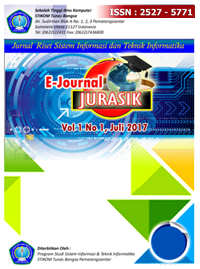E-Learning Supported by Media Social WhatsApp for Student Engagement and Learning Outcomes
Abstract
This study proposes e-learning supported by WhatsApp social media for student engagement and learning outcomes. Based on literature studies, there are four parameters that can be used in WhatsApp to support e-Learning, namely: get information, learner interaction, instructor presence, and for learning purpose. The impact of e-Leaning on student engagement and learning outcomes is carried out at the XYZ Campus, as a business training institution for MSME entrepreneurs in Indonesia. The results showed that most respondents from 4 groups agreed that WhatsApp was appropriate as a learning medium to increase business knowledge to support e-learning that could affect student engagement and learning outcomes.
Full Text:
PDFReferences
A Strategy using Social Media to Increase Students Engagement in ELearning for the Equivalency Education Program (E-LEEP). IOP Conf. Series: Journal of Physics: Conf. Series 1235.
Ekpe, I., Ofeimun, G., Yaacob, M., & Nizamuddin , M. (2018). Social Media and Student’s Learning Outcome: A Case in South-East Asia. Journal of Entrepreneurship and Business, Vol. 6, Issue 2, pp. 1 - 10.
Purwanto, P., Setiyatna, H., Giyoto, G., Junanto, S., Hibana, H., Alwiyah, N., & Surahman, S. (2019). The influence of it-based learning media toward attitude, self-efficacy, and motivation of MSMES in developing its business. Journal of Entrepreneurship Education. Vol. 22, Issue 1.
Tarantino, K., McDonough, J., & Hua, M. (2013). Effects of student engagement with social media on student learning: A review of literature. The Journal of Technology in Student Affairs, 1(8), 1-8.
Panigrahi, R. (2017, June). Online Learning: Improving the Learning Outcomes. In Proceedings of the 2017 ACM SIGMIS Conference on Computers and People Research (pp. 203-204).
Koomson, W. K. Ontology of Ubiquitous Learning: WhatsApp Messenger Competes Successfully with Learning Management Systems (LMS) in Ghana. International Association for Development of the Information Society, International Conference Educational Technologies 2019.
Rashid, T., & Asghar, H. (2016). Technology use, self-directed learning, student engagement and academic performance: Examining the interrlations. Computers in Human Behavior, 63, 604-612.
Gray, J., & DiLoreto, M. (2016). The Effect of Student Engagement, Student Satifsfaction, and Perceived Learning in Online Learning Environment. International Journal of Educational Leadership Preparation, 11(1), 1-20.
Susilo, A. (2014). Exploring Facebook and Whatsapp as Supporting Social Network for English Learning in Higher Education. Teaching And Learning In The 21st Century.
Rambe, P., & Bere, A. (2013). Using mobile instant messaging to leverage learner participation and transform pedagogy at South African University of Technology. British Journal of Educational of Technology, 44(4).
DOI: http://dx.doi.org/10.30645/senaris.v4i2.221
Refbacks
- There are currently no refbacks.
 








